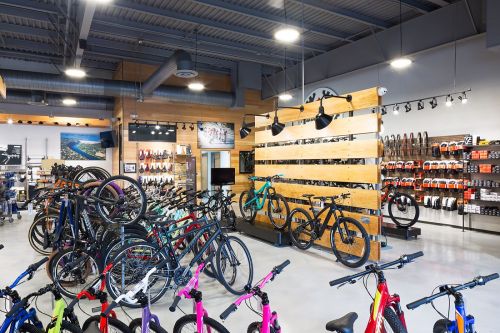AUSTIN, Texas (BRAIN) — Bike shops, suppliers and nonprofits across the industry — along with thousands of employees — have benefitted from the Paycheck Protection Program, which provides forgivable loans for organizations that maintain payroll during the COVID-19 pandemic.
At least 136 bike-related companies and 14 nonprofit organizations received PPP loans, helping save nearly 1,500 jobs across the industry. The loans to bike-related organizations on a list released this week totaled at least $39.85 million at the low-end of the ranges provided, and not counting loans of less than $150,000 each. The full list.
"It allowed us to keep on payroll approximately 35 people that we didn't have a role for as we were developing an e-com and curbside drop-off/pick-up model," said Hill Abell, the CEO of Bicycle Sports Shop in Austin, Texas.
The shop received a loan of between $350,000 and $1 million, which will be turned into a grant and forgiven after the company documents that at least 60 percent of the money was used for payroll.
"We were able to rehire 100 percent of our staff who were willing to work under current conditions by the end of May, so a total of about 90 people currently on staff," he said. "We will meet all the stipulations for full forgiveness of the PPP loan and should have no repayment obligation."
The Small Business Administration and the Treasury Department released the data at the request of several news organizations and other groups. The data includes the names of more than 60,000 businesses that received loans of at least $150,000, up to the $10 million maximum.
The program is part of the $2 trillion Cares Act; it still has about $138 billion available and has been extended for another month.
A PPP loan in March came at the right time, said Russell Chandler, the owner and general manager of Full Cycle, in Boulder, Colorado.
"It was a pretty big thing for us. It came at the end of the winter where frankly had we not received it I don't know if we would have even opened for the year," he said. "It gave us a way to cover payroll when we didn't know if we would be able to open and make a business out of it this year."
After the initial shock, sales at Full Cycle came back strong. "We ended up hiring aggressively and now we have the best team we've had in the history of the shop," Chandler said.
The SBA and Treasury reported loan amounts in ranges, not exact amounts.
BRAIN examined the list for bike-related companies and organizations, searching for bike-related key words and the names of well-known companies and organizations. It's likely we missed several companies.
"It gave us a way to cover payroll when we didn't know if we would be able to open and make a business out of it this year." — Russell Chandler, Full Cycle
We totaled up the dollar amounts using the lowest number in the dollar range, meaning that the actual dollar total for our industry could be nearly $80 million if loans were at the high end of the range.
The list does not name businesses that applied for loans of less than $150,000 — likely the majority of loans to bike retailers and small suppliers. The average loan size was $107,000.
Companies listed the number of jobs that the loans would help preserve. According to the database, the loans helped maintain 974 jobs at for-profit companies and 577 at nonprofit organizations.
Some companies that applied for loans but then withdrew or declined the loan remain on the list. That may include one bike-related company, the electric scooter startup Bird. The CEO of Bird had earlier told the media that the company never applied for a PPP loan, but Bird is still on the list as receiving a loan of at least $5 million. The company said it had never applied, and its bank, CitiBank, told TheVerge.com that it had never submitted an application.
South Carolina wheel maker Boyd Cycling received a PPP loan of less than $150,000, which helped it continue employing eight workers without interruption, co-founder Nicole Johnson told BRAIN.
"We used it specifically for payroll," Johnson said, noting that for Boyd, as for many industry suppliers, sales declined rapidly in March but then rebounded.
"We're are going to grow this year, after all this. It turned out to be a silver lining," she said.
At New Mexico-based distributor Bicycle Technologies International, the loan got the company through a period when state laws forced it to shut down for a period in April, said BTI president Preston Martin.
"Even after being recognized as an essential business, BTI was limited to a headcount of five people in its warehouse throughout April. The funds helped keep our staff intact until we were authorized by the state to return operations to normal. Dealers were incredibly patient with the delays. The good news is that same day shipping is much more consistent now," he said.
— Dean Yobbi and Steve Frothingham contributed to this story.


